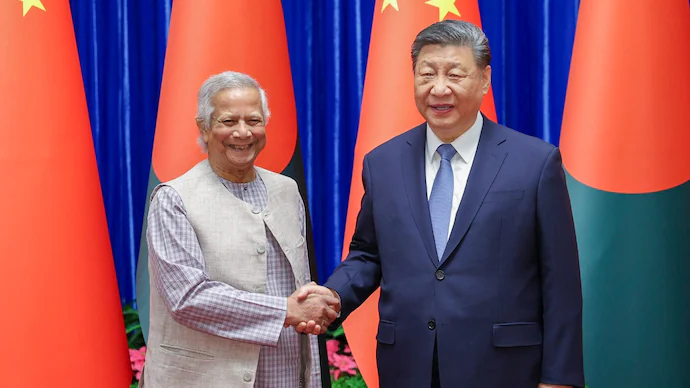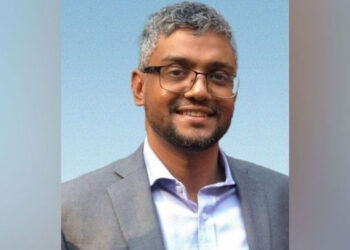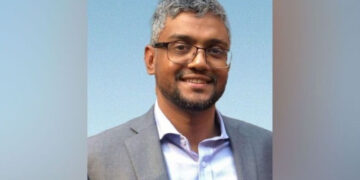Dhaka, Apr 20, 2025 — Chief Adviser Professor Muhammad Yunus hosted Chinese Ambassador to Bangladesh Yao Wen at the State Guest House Jamuna Saturday with high-ranking diplomatic talks to step up bilateral cooperation. The discussion centered around how to make the outcome of the Chief Adviser’s visit to China last week into tangible, implementable projects that would frame Bangladesh-China relations to the next few decades.
The event, which was graced by the highest-ranking government officials including Foreign Adviser Md Touhid Hossain, National Security Adviser Dr Khalliur Rahman, BIDA Chairman Chowdhury Ashik Mahmud Bin Harun, Special Assistant Faiz Taieb, Cabinet Secretary Sirajuddin Mia, and SDG Coordinator Lamiya Morshed, discussed the wide array of sectors—from trade and infrastructure to healthcare, education, agriculture, and cultural exchange.
Momentum for Early Adoption
Our topmost thing to do is to implement the decisions reached between the China visit, Chief Adviser Yunus added. “We don’t want to let momentum slip away.”
Ambassador Yao was equally insistent, declaring, “This is also our number one objective. We’ve met at one of the senior-most level meetings with China, and we don’t want to wait another two or three years to sign agreements that we want to implement immediately.”
The urgency to act stems from the change of strategic vision between the two countries—a vision that places short-term, tangible gains above prolonged diplomacy.
Read More: Tripploy hiring learning and development Officer
Mega projects and economic zones
Among the projects showcased was the accelerated Mongla and Anowara economic zone developments. Preparations are under way at breakneck speed, BIDA Executive Chairman Chowdhury Ashik Mahmud Bin Harun told reporters. Once initial groundwork is done, the zones will be handed over to developers to be developed fully.
This project will significantly enhance Bangladesh’s industrial capabilities and Chinese companies’ foreign direct investment, among others.
Marine and Industrial Development
They also reaffirmed the intention to purchase four new vessels from China, which are to be delivered by June 2025. They will be deployed to support Bangladesh’s growing sea trade and logistics infrastructure.
In the parallel industrial project, the Chief Adviser recommended the setup of locomotive manufacturing and repair plants at Chattogram and Syedpur. This extends not just to the upgradation of infrastructure but also to the offering of training programs and capacity-building workshops to Bangladesh’s local technicians and engineers. This offer is targeted at enabling self-sufficiency in the rail sector with the help of Chinese technical cooperation and investment.
Healthcare Collaboration Steals the Limelight
Health was one area where the Chinese side showed renewed interest to establish a new, state-of-the-art, fully equipped 1,000-bed hospital in Bangladesh. Plans to establish a specialized unit to treat burns was reaffirmed at Chittagong, with the vision towards upgradation of the healthcare sector and making critical care accessible to the masses.
An impetus towards cross-border medical tourism and cooperation, Ambassador Yao was apprised of the initiation of a direct Kunming–Chittagong route. China is also making arrangements to bring forward the process of medical visas to Bangladeshi citizens going to Chinese hospitals for treatments.
Read More: BDT 15,000cr Chattogram Port Bay Terminal to be approved soon by NEC
Investment Delegation and Mini Summit
Ambassador Yao further assured that the Commerce Minister of China will be visiting Bangladesh soon, at the head of the Chinese investor delegation of 100 members. It will be synchronized with the mini investment summit, to be hosted by BIDA, to discuss the sectors and attract new capital to Bangladesh’s growing economy.
“This summit will allow us to identify sectors where Chinese capital and capabilities can fuel transformative growth,” added BIDA Chairman Ashik
Increased Trade: From Machinery to Mango Trees
The bilateral trade of agricultural commodities between the two countries can be expected to grow, with Bangladesh planning to export mangoes to China this season followed by jackfruits next season. Tongue-in-cheek but symbolic, the scholar declared, “I’ll send fresh mango basket to President Xi personally.”
On the trade side, Professor Yunus further emphasized enhanced Bangladesh jute exports, as well as greater Chinese participation towards the modernisation of the jute and locomotive sectors.
Educational Cooperation and Cultural Exchange
Realizing the importance of soft power, the Chief Adviser proposed an establishment of Chinese Cultural Centre and Language Institute in Bangladesh. This will give more Bangladeshis an access to knowledge of Chinese language, culture, and civilization, which would strengthen people-to-people contact at the grassrootslevel
50-Year Overview of the Teesta River and Water Management
The most ambitious outcome of the summit was the joint decision to prepare a master plan of sustainable water management spanning the period of 50 years with particular emphasis on the Teesta River basin. It is aimed at the resolution of the issues of water security, agricultural sustainability, and environmental resilience through cooperative planning and technical collaboration.
A New Era of Bilateral Relations
The Saturday meeting emphasized the mutual aspiration to take the Bangladesh-China relationship to the next phase one that is marked by practical enhancement, mutual respect, and forward-looking planning.
With negotiations under way, planned visits, and projects set to be initiated, the two parties seem keen to shift away from rhetoric towards more forward-looking cooperation. As Prof. Yunus aptly put it, the future of Bangladesh-China ties is not what we discuss, but what we deliver and we are prepared to deliver.
Share via:



















